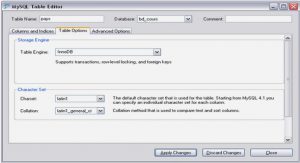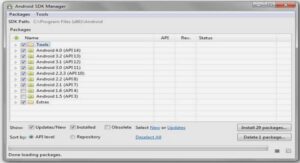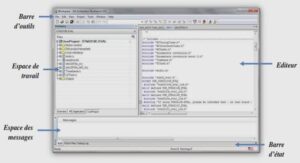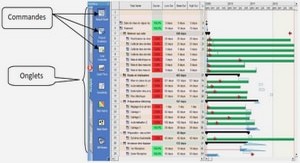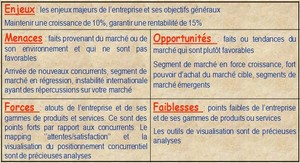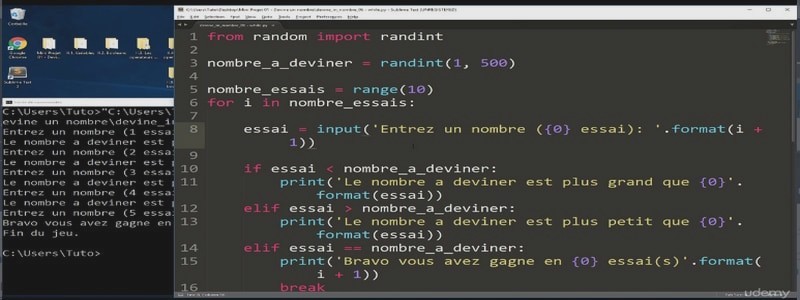Cours LUA ou Programmation en Lua
1. Introduction à Lua
- Langage de script léger : Lua est conçu pour être rapide et facile à intégrer.
- Syntaxe simple et lisible : La syntaxe de Lua est proche de celle de nombreux autres langages, ce qui le rend facile à apprendre.
- Utilisation courante : Lua est largement utilisé dans les jeux (par exemple, Roblox, World of Warcraft), l’automatisation de scripts, et le développement d’applications.
2. Installation de Lua
- Téléchargement : Vous pouvez télécharger Lua depuis le site officiel lua.org.
- Installation :
- Pour Windows : Téléchargez un binaire précompilé ou utilisez un gestionnaire de paquets comme Chocolatey.
- Pour macOS : Utilisez Homebrew avec la commande
brew install lua.
- Pour Linux : Utilisez votre gestionnaire de paquets (par exemple,
sudo apt-get install lua5.3 pour Debian/Ubuntu).
ex dialogue.lua : les différentes sections
Appels des différents fichiers via des dofile
Interface utilisateur : lancement de la première
intervention du système
Chargement du système
envoi des entrées utilisateur au système
Système : master.lua Initialisation de l’analyse, de la tache, définition d’une
typologie des différents éléments utiles Traitement des énoncés utilisateurs et des réactions système
Cours LUA ? vous pouvez télécharger des cours complet de programmation Lua du niveau débutant à expert, vous allez aussi pouvoir améliorer vos connaissances sur les fonction LUA et exécuter des algorithmes sans difficultés. Aussi une sélection des meilleurs formations et cours avec exercices corrigés pour apprendre les bases de la programmation Lua.
Lua App Creation Tutorial
Will be used by Game developers to create Games for Samsung Consumer lectronics devices.
Samsung Game Framework is packaged as part of Samsung SDK so that game developers get an easy environment to create the game contents very quickly and to effectively utilize the capabilities of Samsung Game Framework. Samsung SDK provides integrated Game framework in which developers develop games using API set on Windows (X86) on PC without the need of actual target system (such as DTV with Samsung Smart TV) and the same seamlessly runs on the latter.
One more benefit of using Samsung SDK is to achieve cross platform independence. Consumer Electronic devices may use different cores like ARM, MIPS, etc. If game content developers use Samsung SDK, the game content would be working fine for 2011 and later Samsung Consumer devices which are released. So game developers are free from worrying about the underlying hardware on which their games would be running on.
Why choose Lua?
Well, Lua is a powerful, fast, lightweight, embeddable scripting language. Lua combines simple procedural syntax with powerful data description constructs based on associative arrays and extensible semantics. Lua is dynamically typed and
as automatic memory management with incremental garbage collection, making it ideal for configuration, scripting, and rapid prototyping.
Lua is a proven, robust language
Lua is currently the leading scripting language in games. Lua has been used in many industrial applications with an emphasis on embedded systems (e.g., the Ginga middleware for digital TV in Brazil) and games (e.g., World of Warcraft). Lua has a solid reference manual and there are several books about it. Several versions of Lua have been released and used in real applications since its creation in 1993.
Lua and exceptions
Raise with error(), assert(), lua_error()
● Catch with pcall()
● Implemented with C longjmp()
● Error object not limited to strings
● No try-except construct
Try-except definition
try(f, catch_f)
– Executes function f, and if an exception results then catch_f is called with the error object.
● Differs from xpcall()
– propagates exceptions rather than returning nil-error
– error handler supports nested errors
Try-except issues
Slightly verbose
– use token filter: $try … $catch(e) … $end
● Functional implementation doesn’t support direct return from try/catch
– native implementation would solve this
● Coroutine yield cannot be used within a pcall
– copcall() is a workaround
● Add finally block?
– not as significant as for C
– D’s “scope hook” concept is better
How error locations are conveyed in Lua
Error system does not have concept of error location
● Convention is to pre-pend location to error string
● error() does this for you
● … but only for string exceptions
Syntax and Semantics
Lua is syntactically similar to Pascal and semantically similar to Scheme. Figure 1.1 shows an example Lua program, which calculates the square root of 2 using Newton’s method.
On line 1 the newton function is defined, taking 2 arguments a and x. Since Lua is dynamically-typed, no types are specified in the argument definitions. Lines 2 and 3 declare local variables using the local keyword. The scope of these variables is limited to the newton function. Global variables need no declaration and can be accessed from any scope in the current Lua context. Lines 4 and 7 define a loop which repeatedly executes its body, lines 5 and 6, until the expression math.abs(x – oldx) < tolerance is true. Finally, the result is returned using the return keyword on line 8. Line 11 illustrates how the newton function can be called, and prints the result to standard output.
